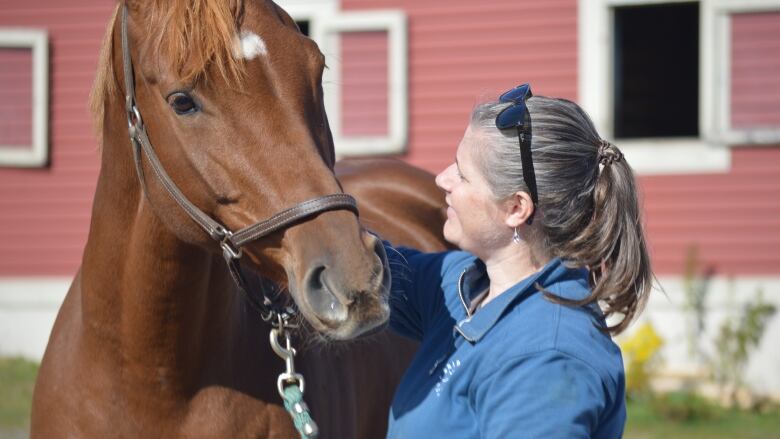Horse therapy? Neigh, says Susan Quigley it's horse school
Program at Bridle Path Stables focuses on emotional regulation

You've probably heard of horse therapy but have you heard of horse school?
At Bridle Path Stables in Goulds, Susan Quigley offers the usual riding lessons but she also runs a program called Equine Assisted Learning.
"This is actually not a therapy program at all," Quigley told CBC Radio'sOn The Go. "It's using horses to teach."
The program is designed to help people prevent future issues by learning how to regulate their emotions or take control of a situation, she said.
"It really helps you learn how to self-regulate yourself when you're around them," Quigley said.

Horses are particularly suited to this kind of program because they are a prey animal, she said, and are intuitive and sensitive to humans and their surroundings. That sensitivity means that when humans interact with horses, they must regulate their own behaviours and emotions in order to help the horse stay calm and follow their commands because the animals feed off our feelings and mirror them, she said.
Working with children
At Bridle Path Stables, Quigley often works with groups of children something that could be overwhelming to a horse, given children's natural energy and excitement to be around the animals.
"If you threw five of those children with a horse, just think about that," she said.
But the children quickly realize that if they are too worked up, the horse will not engage with them. That disengagement isn't done in a negative way, she said the horse doesn't yell or become physical, it just backs away, giving the person working with the animal important information about how it feels.
On the other hand, when the person's actions change, the horse's actions change too. Children get a chance to see that how they act affects others, and to have a rewarding experience in which their positive actions have a positive result.
"Instead of the horse leaving a situation, the people that are involved, or the children, actually have to learn how to self-regulate themselves," Quigley said.
'It's pretty amazing'
After the sessions, program participants talk about how things went, what they learned and how it affected them. Empathy, teamwork, self-esteem, communication and trust can all be part of the conversation, she said.

It's a discovery learning model that can benefit all ages, but children can be especially responsive
The kids love it, but the reactions of the adults watching them learn more about their feelings and themselves by working with the horses is also part of the reward, Quigley said.
"It's pretty amazing when you see parents walk away with tears in their eyes."
With files from On The Go












_(720p).jpg)


 OFFICIAL HD MUSIC VIDEO.jpg)
.jpg)



























































































